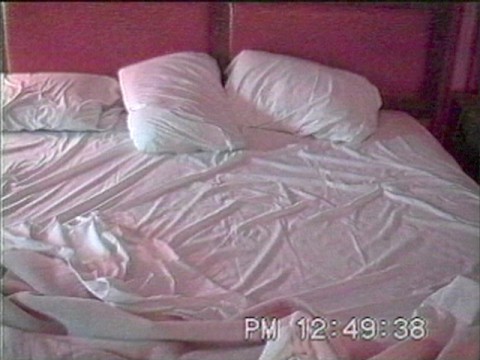French conceptual artist Sophie Calle was born in Paris in 1953. In her early twenties, she embarked on a trip around the world, returning to Paris in 1978, overcome with feelings of loss and intimidation. For months she rarely left home, and when she finally summoned the courage to venture outside, she followed random strangers in an effort to reacquaint herself with the city. This early activity set the foundation for a thirty-year career of intimate and, at times, invasive portraits of herself and strangers that test the terms and limits of the private and public realms. She has tailed unknowns, examined personal relationships, and investigated private lives, subsequently documenting her findings in textual and photographic accounts. Calle’s works are reflections on loss, absence, disappearance, and, consequently, desire; the construction of intimacy and identity; and the concept and perception of truth.
Calle’s early projects were usually rituals devised to resolve personal difficulties. Her first major work, _The Sleepers_ (1979), took place over the course of a week, during which Calle invited forty-five friends and strangers to sleep in her bed for eight hours each. In _The Striptease_ (1979), Calle recalled her childhood practice of running naked in her grandparents’ hallway by performing the same act in a Parisian strip club. These actions later developed into projects that aggressively cross the lines of the private and public spheres. They also unwittingly implicate the viewer, who simultaneously feels a sense of unease and anticipation upon observing Calle’s disregard for social and personal boundaries.
For _Suite Vénitienne_ (1981), she followed a man from Paris to Venice and, unbeknownst to him, documented his every move in photographs and text. A year later, Calle returned to Venice and found work as a hotel chambermaid. In addition to cleaning, she explored the rooms, and documented the beds, suitcases, dirty laundry, bathroom cabinets, and even personal letters and diaries of the hotel guests in a photo-text installation and book entitled _Hotel_ (1984).
_Address Book_ (1983) is arguably her most controversial work. After finding a man’s lost address book on the street, Calle went about contacting all of the people listed in it. To create a portrait of the man, she conducted several interviews, the results of which she reported to the French newspaper _Libération_. The subject was furious when he learned of her activities, and he retaliated by publishing a nude picture of Calle. Nevertheless, Calle has not been afraid to reveal herself to the public. She often reverses her process and turns the focus onto her own life. For _The Detective_ (1981), she instructed her mother to hire a detective to follow her and report on her daily movements. For that work, she also followed the writer Paul Auster's instructions in a collaboration called _Gotham Handbook: Personal Instructions for SC on How to Improve Life in New York City (Because she asked...)_ (1999).
Calle’s later works frequently explore concepts of sight and perception, as well as the experience and comprehension of loss. For _The Blind_ (1986), she asked several sightless people to describe their image of beauty. _Exquisite Pain_ (2005) documents the period after one of Calle’s breakups, during which she asked people to describe their most emotionally painful memory. Finally, _Take Care of Yourself_ (2007) was also the result of a failed relationship. Calle asked 107 women to interpret the e-mail message in which her boyfriend had ended their relationship. The diverse, surprising responses were characterized by the women’s professions, which included clown, actress, lawyer, copy editor, and psychoanalyst.
Once again Calle examined a personal situation from more than one vantage point in the bilingual, autobiographical road movie _Double Blind_ (1992). The work intertwines art and life in video and photographic sequences that document a road trip from New York to California that Calle made with American artist Greg Shephard. The drive begins in New York City just after the death of French author Hervé Guibert, a close friend to whom the film is dedicated. It continues through the Deep South and culminates in Las Vegas, where Calle and Shephard marry at a drive-thru window, despite the precariousness of their relationship. Events and dialogues from the trip are combined with voice-overs by Calle and Shephard that function as (often contrasting) personal diaries. Punctuated by Calle’s continual refrain, “No sex last night,” the couple’s interior monologues reveal their hidden fears, desires, and resentments. Calle and Shephard's relationship and marriage involves genuine emotion, particularly when Calle becomes jealous after she discovers Shephard's phone calls and letters to another woman. Ultimately, the juxtaposition of daily chronicles with taped confessions demonstrates, as Calle does time and again, the thin lines between subject and object, public and private, and fiction and reality. _—Kanitra Fletcher_

